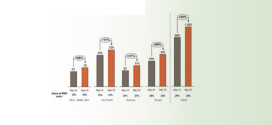Tod Burwell, president and chief executive of BAFT-IFSA, the international association for transaction banking organisations, has praised the European Union for agreeing regulatory amendments that should help to shield trade finance from being squeezed by the new Basel III global banking standards.
There was widespread concern that the Basel III capital requirements – designed to guard against a repeat of the 2008/09 financial crisis – had failed to take account of the low-risk nature of trade finance.
There was a fear that the new regime might force banks to set aside capital against trade finance exposures to the same extent that they will be required to do for much riskier types of business. Burwell has been among a number of prominent voices to have spoken out on the issue.
However, the EU has now recognised the danger that over-zealous regulation could unnecessarily hamper the volume of finance available to fund the international trade that is so essential for economic recovery.
“We commend the European Union for recognising how important trade finance is to economic growth in their adoption of the Capital Requirements Directive IV, implementing Basel III in the EU. Amendments agreed by the EU institutions on capital, leverage and liquidity requirements for trade finance recognise the intrinsically safe nature of these products and their importance to companies, consumers and job creation,” says Burwell.
“Through these amendments, the European Union has taken significant steps to alleviate the regulatory burden for trade finance and to ensure it remains available and affordable to importers and exporters. This is a positive outcome for the real economy, and we ask the G-20 and the Basel Committee to recommend that these Basel III changes be adopted in all member jurisdictions around the world.
“We will continue to work with the business community and other financial industry groups to encourage regulators to harmonise these sensible, pro-growth changes during the global implementation process.”
 Cash And Trade Magazine For Cash and Trade professionals in the Middle East
Cash And Trade Magazine For Cash and Trade professionals in the Middle East





One comment